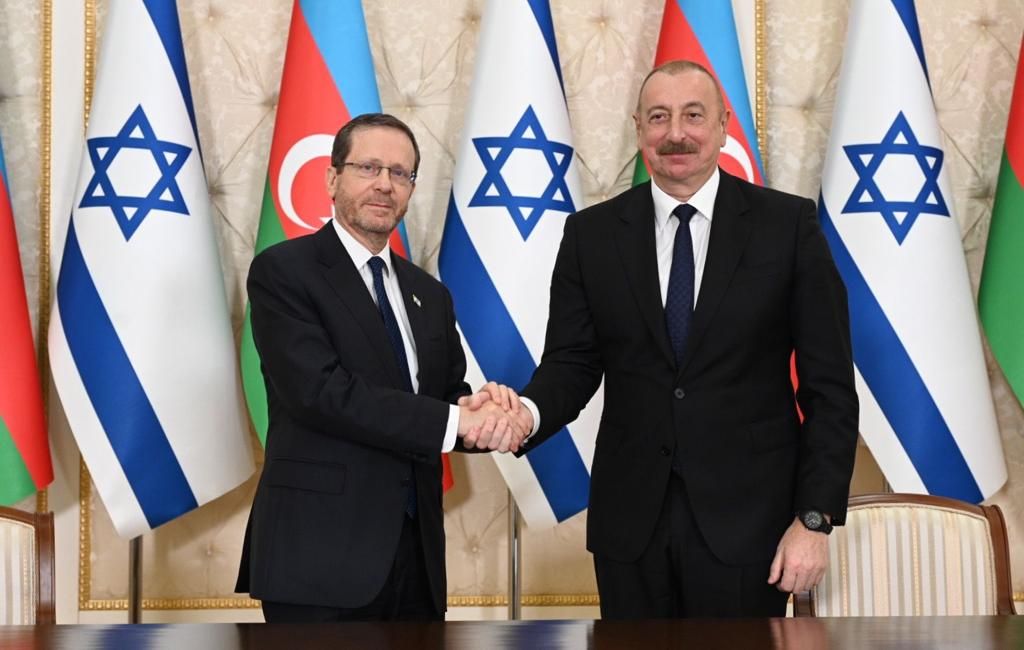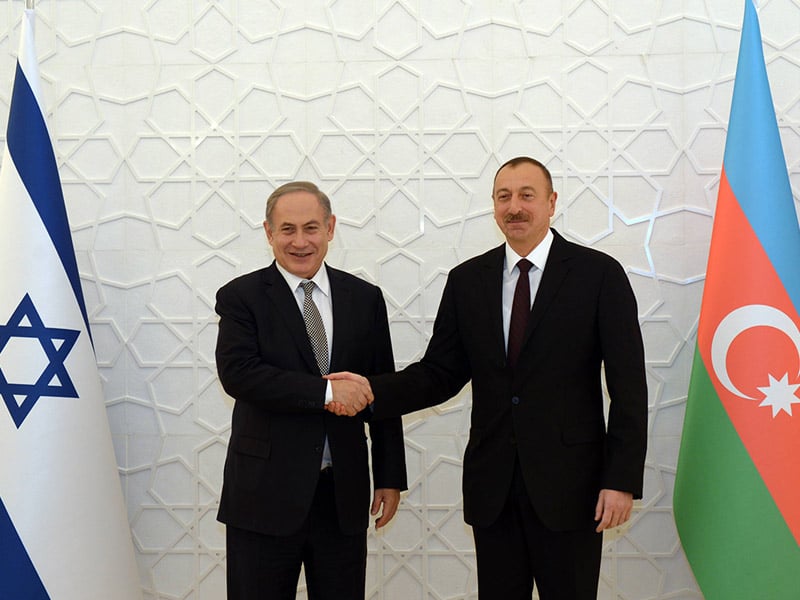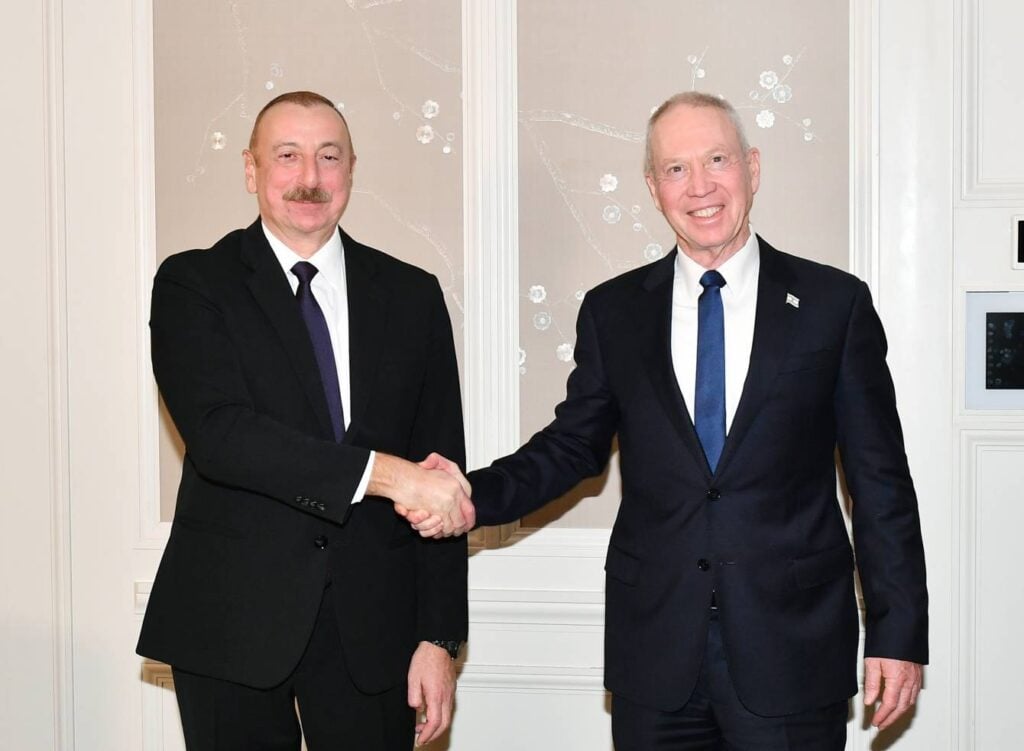
As the world watches the Hamas-Israel War wage on, support for Israel has never been more paramount. One country whose steadfast support for Israel has been greatly overlooked is Azerbaijan.
On October 7th, several Azerbaijani publications conducted polls among their readers to find who the public supports in the war. The polls found that almost two-thirds of Azerbaijanis support Israel. As the world stands witness to the carnage caused by Hamas, the Azerbaijani people are doing everything they can to show their support for Israel. Israeli Ambassador to Azerbaijan, George Deek, thanked the Azerbaijani people for their gesture of support, referencing the flowers and lit candles left outside the Israeli Embassy in Baku. The Azerbaijani Foreign Ministry condemned the violence against civilians and called for early de-escalation. Israel continues to have the support and sympathies of the Azeri majority as the war wages on.
Azerbaijan’s support for Israel is a result of a years-long friendship between the two countries. Azerbaijan and Israel’s close relationship can be traced back to the fall of the Soviet Union, but Azerbaijan’s relationship with the Jewish community is centuries old. The Jewish presence in Azerbaijan dates back centuries, with evidence suggesting that Jews settled in the region during the Persian Empire. Throughout history, Azerbaijan has been a place where the Jewish community could live peacefully and is one of the few places in the world that has been unsullied by antisemitism. During the medieval period, Azerbaijan became a center for Jewish scholarship and culture. Notably, the town of Quba had a thriving Jewish population, and it became known for its Jewish educational institutions.
Today, Azerbaijan has a sizable and influential Jewish community with approximately 30,000 Jews living in Azerbaijan. Currently, there are six synagogues operating in Baku and the numbers are only growing. Azerbaijan’s capital, Baku houses one of the biggest synagogues in Europe. Built in 2003, the Synagogue of Ashkenazi and Georgian Jews is considered to be the first synagogue built in the Near East in sixty to eighty years. This impressive synagogue is three stories high and has the name and organization of each person involved in its construction engraved on boards at the entrance of the temple, paying homage to how the local Jewish organizations, international Jewish organizations, as well as the Baku and Russian Orthodox Church and Caucuasian Muslim Office all came together to honor the Azerbaijani Jewish community. Other Jewish heritage sites that operate to date in Azerbaijan include the Synagogue of Ashkenazi Jews, the Synagogue of Mountain Jews, “Alti Gumbaz” Synagogue Gilaki Synagogue, “Ashagi Mahalla” Synagogue, “Yukhari Mahalla” Synagogue, and The Museum of Mountain Jews.
With centuries of goodwill between Azerbaijan and the Jewish community, it is no surprise that Azerbaijan has close bilateral relations with Israel. Azerbaijan is one of Israel’s closest allies, and is their strongest ally in the South Caucasus region.
Despite the grave threat Azerbaijan faces from Iran, Azerbaijan continues to steadfastly stand with Israel. When Azerbaijan announced its embassy in Tel Aviv, Iran responded with a deadly attack. In response to the announcement, the Azerbaijani Embassy in Tehran was attacked last International Holocaust Memorial Day. One diplomat was killed and two diplomats were injured and Azerbaijan was forced to evacuate its embassy.
In response to Azerbaijan’s deepening ties with Israel and a deep-seated paranoia over any separatist movements from the Azeri ethnic minority in northern Iran, Iranian dissidents have also waged an assassination attempt against Azerbaijani MP Fazil Mustafa, and tried to kill Ahmad Obali, an Azerbaijani dissident in the US and his son Deniz. Sitting right on the border with Iran and with a large Azeri ethnic minority in northwestern Iran, the Republic of Azerbaijan is a prime target for Iran’s attacks. As Azerbaijan continues to strengthen its relations with Israel, Iran grows more hostile.

United under the threats they face from hostile foreign powers, Azerbaijan and Israel enjoy close cooperation on defense, energy, and security. Israel provided Azerbaijan with vital military support and two new Israeli defense technology firms, Meteor Aerospace and SpearUAV, are expected to sign deals with Azerbaijan on drone development by 2024. Azerbaijan receives 69% of its arms imports from Israel and the main Israeli partners of Azerbaijan’s Ministry of Defense Industry are Elbit Systems, Israeli Aerospace Industries (IAI), and Aeronautics Defense System which was acquired by Rafael Advanced Defense Systems in 2019. Israel Aerospace Industries are also supplying Azerbaijan with two satellites, signaling the strengthening of defense ties between Israel and Azerbaijan. To defend itself from further Iranian military activities, on its border, Azerbaijan has closed a deal to buy Iron Dome missile defense batteries from Israel in 2021 and considered purchasing Israel’s Arrow-3 defense missile system later that year.
In turn, Azerbaijan is a major supplier of oil to Israel, supplying 40% of Israel’s crude oil needs. The majority of the country’s oil is exported through the Baku-Tbilisi-Ceyhan (BTC) pipeline, which has a capacity of 1.2 million barrels per day. Since the implementation of the BTC pipeline, Azerbaijan has become a significant oil and gas producer and the share of Azerbaijani oil shipped to Israel has steadily increased.
For Israel, the oil transported through the BTC is strategically important. Since 2009, when BTC reached its full capacity, the share of Azerbaijani oil shipped to Israel has significantly increased. In November, Israel issued 12 new licenses for natural gas exploration in the Mediterranean Sea to six companies. Among these is Azerbaijan’s state oil company Socar, which will explore north of the Leviathan gas field.

Azerbaijan and Israel’s relationship goes beyond defense and security. In his letter to President Issac Herzog congratulating Israel on its 75th anniversary of independence, President Ilham Aliyev of Azerbaijan commended the growing ties between Israel and Azerbaijan. President Aliyev expressed his belief that the people of Israel and Azerbaijan are connected by a centuries-long friendship and feelings of mutual affinity. President Aliyev praised the high-level dialogue existing between the two countries and believes this will lead to further, mutually beneficial cooperation. He believes that Azerbaijan establishing Trade and Tourism Representative Offices as well as an embassy in Israel will only lead to more fruitful relations between their two countries. Azerbaijan consistently strives to expand its relations with Israel and sees it as one of its greatest, strongest allies.
In turn, President Herzog visited Baku in July, stating that “visiting Azerbaijan is a dream come true for me and for my nation”. President Herzog has expressed that Israel’s and Azerbaijan’s relationship is based on a joint strategic vision for peace and the common good. President Herzog lauded the strengthened relations between Israel and Azerbaijan and looks forward to furthering the cooperation between the two countries. Herzog’s visit signals the expansion of bilateral relations between Azerbaijan and Israel and President Herzog has publically invited President Aliyev to visit Israel.
Israel and Azerbaijan’s bilateral relations are guided by a shared commitment to maintaining justice and integrity in the global arena. They share a close, unparalleled kinship as they both choose to defend their sovereignty and counter the multitudes of attacks levied against their countries. They stand united against the threat of Islamic extremism, deepening their defense ties and creating a long lasting partnership for regional security.












